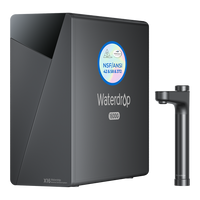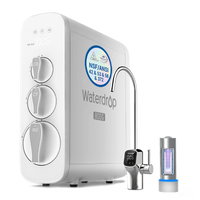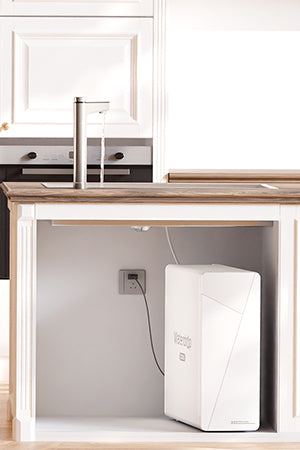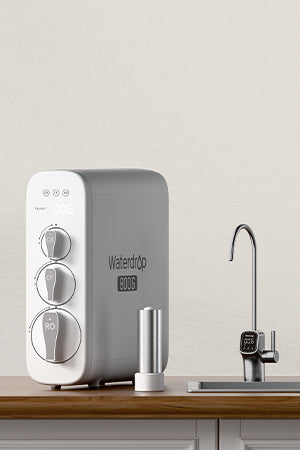Canada is home to some of the cleanest water sources in the world, but not all water is equal when it comes to quality, taste, and safety. Whether you're filling a glass from the tap, buying a bottle from the store, or using a home filtration system, you may be wondering: Which water is best to drink in Canada? The answer is reverse osmosis water. Read on to find out the reasons.
Is Tap Water Safe to Drink in Canada?
For the most part, yes. Tap water in Canada is regulated by provincial and municipal authorities and is considered safe to drink. However, the quality of tap water can vary depending on where you live.
While most cities add chlorine to kill bacteria, some tap water may still contain:
- Trace amounts of lead (especially in older homes with outdated plumbing)
- Microplastics
- Chlorine by-products
- Sediment or rust
It's also worth noting that water may pick up contaminants on the way from the treatment plant to your tap.
Bottled Water: A Convenient But Costly Option
Bottled water is widely available across Canada and often marketed as pure or natural. However, many bottled waters are simply filtered tap water. Additionally:
- Bottled water is expensive over time
- Plastic waste harms the environment
- Some bottles may leach microplastics into the water
While it's convenient in a pinch, bottled water isn't a sustainable or necessary everyday solution—especially when there are better, more eco-friendly alternatives.
Spring Water: Naturally Sourced, Lightly Filtered
Spring water is collected from underground sources and is praised for its fresh taste and natural minerals. It's often considered more “pure” than tap water, but it's not always the cleanest. Some spring water is only lightly filtered and may not undergo strict testing.
It can be a good choice if you enjoy the taste and buy from a reputable brand—but be prepared to pay more for it.
Filtered Water: A Balanced, Everyday Solution
Filtered water is becoming more common in Canadian homes thanks to its affordability, convenience, and improved quality. Filtration systems vary in strength—from simple pitchers to more advanced under-sink systems.
A quality water filter can reduce or eliminate:
- Chlorine taste and odour
- Heavy metals like lead
- Sediment, rust, and microplastics
- Chemical contaminants such as PFAS
One of the most effective filtration methods is
reverse osmosis (RO) . RO systems use multiple layers of filtration to purify water, removing up to 99% of contaminants. These systems are ideal for homes that want long-term access to clean, great-tasting water.
Distilled Water: Pure But Lacking Minerals
Distilled water is created by boiling water and condensing the steam back into liquid. This process removes almost all contaminants—but it also strips away healthy minerals like calcium and magnesium. Because of this, distilled water isn't ideal for daily drinking unless it's part of a specific medical or dietary need.
The 5 Best Waters to Drink in Canada
Choosing the right water depends on your needs and preferences. Here are five popular types of water Canadians drink, ranked for their overall benefits:
1. Filtered Water
Filtered water is a popular choice because it removes common tap water contaminants like chlorine, lead, and sediment.
Reverse osmosis (RO) systems are especially effective, removing up to 99% of impurities, including heavy metals and PFAS. This makes it a reliable option for families and anyone concerned about water quality.
Filtered water is also cost-effective over time and better for the environment than bottled water. Many modern RO systems are easy to install and provide clean, great-tasting water right from your tap. This helps reduce plastic waste and supports a healthier lifestyle.
2. Spring Water
Spring water comes from natural underground sources and often contains beneficial minerals like calcium and magnesium. It has a fresh taste that many people enjoy and is usually bottled near the source to preserve its quality.
However, not all
spring water brands have the same standards. It's important to pick reputable companies that regularly test their water. While spring water tastes good, it may not be the most practical or affordable daily drinking option.
3. Tap Water (in Most Cities)
Tap water in most Canadian cities is safe and regulated by health authorities. It's a convenient and affordable source of drinking water, treated to meet strict safety standards.
That said, quality can vary depending on your location and plumbing. Older homes might have lead pipes, and some water can taste like chlorine. Using a filter can improve both safety and flavour without giving up the convenience of tap water.
4. Bottled Water
Bottled water is handy when you're traveling or don't have access to clean tap water. It's also widely available and sometimes comes from natural springs or filtered sources.
However, it's costly compared to tap or filtered water and creates plastic waste. Since many bottled waters are just filtered tap water, investing in a home filtration system is often a smarter, more sustainable choice.
5. Distilled Water
Distilled water is extremely pure because it's boiled and condensed, removing all minerals and contaminants. It's useful for medical devices or appliances where mineral buildup is a concern.
But it lacks minerals that are good for health and taste. For daily drinking, distilled water isn't ideal because it can taste flat and may not provide important minerals your body needs.
What's the Healthiest Water to Drink at Home?
If your goal is to have the cleanest, safest, and best-tasting water at home, many Canadians are turning to multi-stage reverse osmosis filtration systems. These systems are highly effective at removing contaminants and improving water quality, especially in homes with older plumbing or concerns about water safety.
Some modern filtration systems are compact, easy to install, and come with smart features like filter replacement alerts and real-time water quality monitoring. These solutions make it simple to enjoy clean water directly from the tap without relying on single-use bottles.
Final Thoughts
So, which water is best to drink in Canada? While tap water is a safe and accessible choice in many areas, those looking for an extra layer of protection and better taste may want to explore filtered options—especially reverse osmosis systems. They offer peace of mind, improved water quality, and long-term value for Canadian households.
Whether you're filling up a glass for your child, making coffee, or cooking dinner, knowing your water is clean makes a real difference.










































































